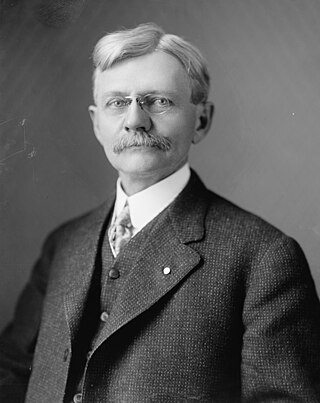
Thomas Riley Marshall was an American politician who served as the 28th vice president of the United States from 1913 to 1921 under President Woodrow Wilson. A prominent lawyer in Indiana, he became an active and well known member of the Democratic Party by stumping across the state for other candidates and organizing party rallies that later helped him win election as the 27th governor of Indiana. In office, he attempted to implement changes from his progressive agenda to the Constitution of Indiana, but his efforts proved controversial and were blocked by the Indiana Supreme Court.

Presidential elections were held in the United States on November 7, 1876. Republican Governor Rutherford B. Hayes of Ohio very narrowly defeated Democrat Governor Samuel J. Tilden of New York. Following President Ulysses S. Grant's decision to retire after his second term, U.S. Representative James G. Blaine emerged as frontrunner for the Republican nomination; however, Blaine was unable to win a majority at the 1876 Republican National Convention, which settled on Hayes as a compromise candidate. The 1876 Democratic National Convention nominated Tilden on the second ballot.

Presidential elections were held in the United States on November 6, 1888. Republican nominee Benjamin Harrison, a former U.S. senator from Indiana, narrowly defeated incumbent Democratic President Grover Cleveland of New York. It was the third of five U.S. presidential elections in which the winner did not win the national popular vote, which would not occur again until the 2000 US presidential election. Cleveland was the last incumbent Democratic president to lose reelection until Jimmy Carter in 1980.

Samuel Jones Tilden was an American politician who served as the 25th governor of New York and was the Democratic nominee in the disputed 1876 United States presidential election.

Thomas Andrews Hendricks was an American politician and lawyer from Indiana who served as the 16th governor of Indiana from 1873 to 1877 and the 21st vice president of the United States from March until his death in November 1885. Hendricks represented Indiana in the U.S. House of Representatives (1851–1855) and the U.S. Senate (1863–1869). He also represented Shelby County, Indiana, in the Indiana General Assembly (1848–1850) and as a delegate to the 1851 Indiana constitutional convention. In addition, Hendricks served as commissioner of the United States General Land Office (1855–1859). Hendricks, a popular member of the Democratic Party, was a fiscal conservative. He defended the Democratic position in the U.S. Senate during the American Civil War and Reconstruction era and voted against the Thirteenth, Fourteenth, and Fifteenth Amendments to the U.S. Constitution. He also opposed Radical Reconstruction and President Andrew Johnson's removal from office following Johnson's impeachment in the U.S. House.

Harry Stewart New was a U.S. politician, journalist, and Spanish–American War veteran. He served as Chairman of the Republican National Committee, a United States senator from Indiana, and United States Postmaster General.
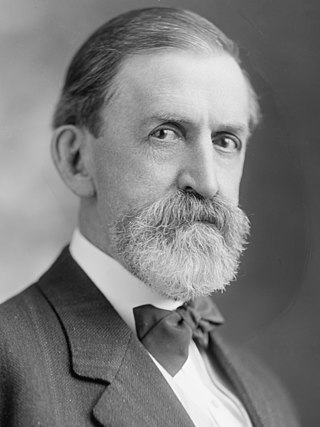
John Worth Kern was a Democratic United States Senator from Indiana. While the title was not official, he is considered to be the first Senate majority leader, while serving concurrently as chairman of the Senate Democratic Caucus. He was also the Democratic vice presidential nominee in the 1908 presidential election.
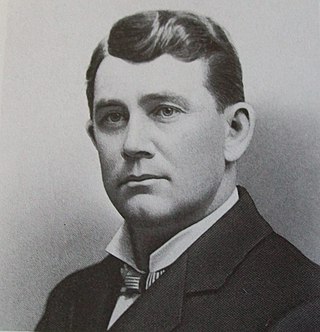
James Franklin Hanly was an American politician who served as a congressman from Indiana from 1895 until 1897, and was the 26th governor of Indiana from 1905 to 1909. He was the founder of Hanly's Flying Squadron, which advocated prohibition nationally and played an important role in arousing public support for prohibition.

Claude Gernade Bowers was a newspaper columnist and editor, author of best-selling books on American history, Democratic Party politician, and President Franklin D. Roosevelt's ambassador to Spain (1933–1939) and Chile (1939–1953). His histories of the Democratic Party in its formative years from the 1790s to the 1830s helped shape the party's self-image as a powerful force against monopoly and privilege. Bowers was a sharp critic of Republicans and their Reconstruction policies for African American voting rights and civil rights.

The 1908 Republican National Convention was held in Chicago Coliseum, Chicago, Illinois on June 16 to June 19, 1908. It convened to nominate successors to President Theodore Roosevelt and Vice President Charles W. Fairbanks.
The history of Illinois may be defined by several broad historical periods, namely, the pre-Columbian period, the era of European exploration and colonization, its development as part of the American frontier, its early statehood period, growth in the 19th and 20th centuries, and contemporary Illinois of today.
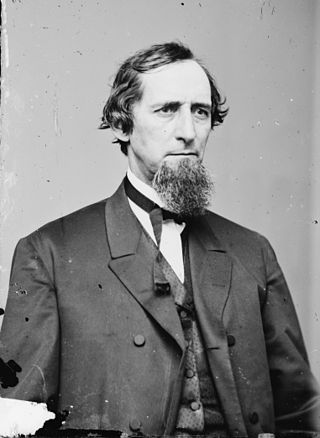
Edgar Cowan was an American lawyer and Republican politician from Greensburg, Pennsylvania. He represented Pennsylvania in the United States Senate during the American Civil War.
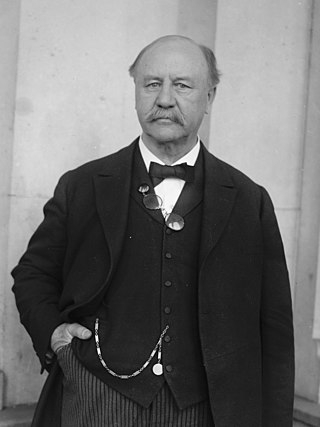
Samuel Moffett Ralston was an American politician of the Democratic Party who served as the 28th governor of the U.S. state of Indiana and a United States senator from Indiana.
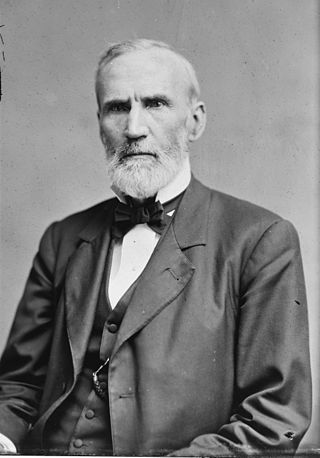
George Washington Julian was a politician, lawyer, and writer from Indiana who served in the United States House of Representatives during the 19th century. A leading opponent of slavery, Julian was the Free Soil Party's candidate for vice president in the 1852 election and was a prominent Radical Republican during the American Civil War and the Reconstruction era.

The Democratic Party of Indiana is the affiliate of the Democratic Party in the U.S. state of Indiana. The party's chair is Mike Schmuhl.

The Indiana Republican Party is the affiliate of the United States Republican Party in the state of Indiana. The chairman of the Indiana Republican State Committee is Randy Head.

Abraham Lincoln Brick was an American attorney and politician. He served five terms in the United States House of Representatives from 1899 until his death in 1908.
The 1880 Democratic National Convention was held June 22 to 24, 1880, at the Music Hall in Cincinnati, Ohio, and nominated Winfield S. Hancock of Pennsylvania for president and William H. English of Indiana for vice president in the United States presidential election of 1880.

Jacob Piatt Dunn Jr. was an American historian, journalist, and author. A political writer and reformer, Dunn worked on ballot reform issues based on the Australian ballot system, authored a new Indianapolis city charter, and served as adviser to Indiana governor Thomas R. Marshall and U.S. Senator Samuel M. Ralston.

Charles W. Miller was an American lawyer, politician, and businessman who served as the eighteenth Indiana Attorney General from January 1, 1903, to January 1, 1907, and as the U.S. Attorney for the District of Indiana from 1909 to 1913.




















